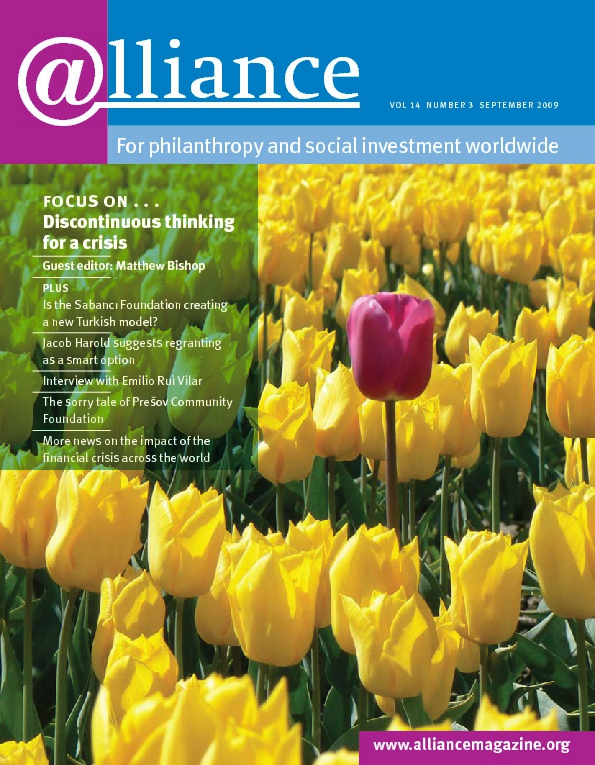Global Development 2.0 is a timely assessment of the changing landscape of development. It explores the common challenges faced by all development players, including questions of accountability; effective deployment of human, technological and financial resources; policy and agenda setting; and the challenges of achieving scale and sustainability. A key concern is to spur debate on new forms of collaboration that include the new actors, most notably mega-philanthropists such as Bill Gates and ‘celanthropists’ such as Bono.
The book was compiled in 2007, a time of much optimism following the 2005 G8 Gleneagles summit, widely regarded as having made great progress with regard to more and better aid, debt cancellation and tackling specific challenges such as HIV/AIDS. It is not surprising, therefore, that this collection of essays collectively answers in the affirmative the question: ‘Can philanthropists, the public and the poor make poverty history?’ Although the Global Call to Action Against Poverty (GCAP) said of the G8, ‘the people roared and the G8 whispered’, anti-poverty campaigners acknowledged that if these promises were met, a significant impact could be seen in many developing countries.
Much has changed since Gleneagles and much of the optimism expressed in this publication has been eroded as the world confronts a perfect storm of crises: food and fuel, financial and economic, poverty and climate change. This volume nevertheless provides useful insights into the possibilities and limitations of the range of actors involved in the development arena.
In the opening chapter, Brainard and LaFleur provide a useful overview of the key issues and challenges in making poverty history. Matthew Bishop, reviewing the role of the new philanthropist, suggests that at best they can ‘do things that others find significantly harder’ because they are unencumbered by shareholders, election cycles and excessive red tape. While both celanthropists and mega-philanthropists have always been around, he suggests that today their ‘outsized influence relative to the traditional players … is an innovation’. Although the overwhelming majority are from the developed world, Bishop largely ignores issues of power, perspective and influence.
Jane Nelson and Simon Zadek correctly argue that we are now living in a moment of history that calls for much greater accountability of all development players, including civil society. While they acknowledge some progress, accountability is often the missing link to ensure development success.
While ‘making poverty history’ will require excellent service delivery at the micro level, more progressive development policies at the meso level and significant changes in governance at the macro level, this volume collectively is much the strongest at the micro level. Zadek’s piece on collaborative governance is the exception, pointing to the realities of fractured multilateralism and broken global governance and arguing that the historical dominance of western countries in development is being broken with the growing economic importance of Brazil, Russia, India and China.
Joshua Busby analyses the Jubilee 2000 debt relief campaign and looks at why it was so successful in having the debt of the world’s poorest countries written off. One factor in this success was the lack of actors opposed to debt relief. While every advocacy campaign has its own distinctive features, this one provides a useful template for conceptualizing the complexities of a global campaign.
Ashok Khosla, in his piece on leveraging knowledge to end poverty, correctly points out that we live in a time when unparallelled wealth lives side by side with extraordinary poverty. He argues that the primary reason for this gaping disparity is unequal access to knowledge, readily accessible to the wealthy and out of reach for the poor. To redress the balance, he says, we have to create more sustainable environments through social enterprises.
The book suffers from an inequitable balance of North and South perspectives: only four of the 14 contributors are from developing countries and only one is resident in the South. There is a growing concern among developing country actors that they are often the recipients of knowledge, paradigms and frameworks generated in the North and continue to be seen as spectators in a process in which they should be central players. The front cover of the book reveals this sense of disconnection, with the two African leaders appearing somewhat perplexed and out of place in comparison to the group of developed country actors.
To order
http://www.brookings.edu/press
Global Development 2.0: Can philanthropists, the public and the poor make poverty history?
Lael Brainard and Derek Chollet (eds) Brookings Institution Press $22.95
ISBN 9780815713937
Kumi Naidoo is co-chair of the Global Call to Action against Poverty (GCAP). Email kumi_naidoo2000@yahoo.com




Comments (0)